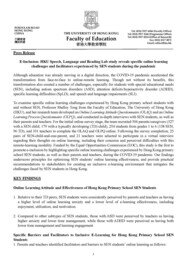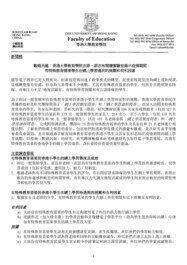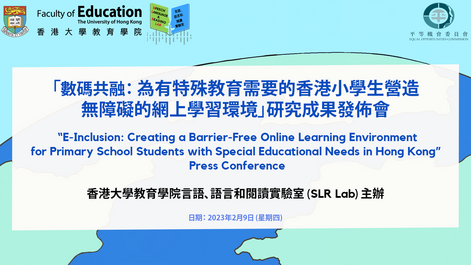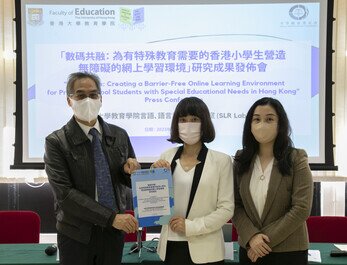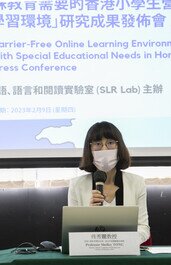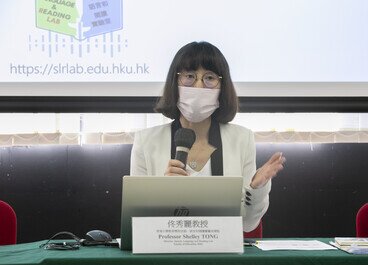Press Release: E-Inclusion: HKU Speech, Language and Reading Lab study reveals specific online learning challenges and facilitators experienced by SEN students during the pandemic
新聞稿:數碼共融:香港大學教育學院言語、語言和閱讀實驗室揭示疫情期間有特殊教育需要學生在網上學習遇到的挑戰和有利因素
Updated on February 09, 2023 (Thu)
E-Inclusion: HKU Speech, Language and Reading Lab study reveals specific online learning challenges and facilitators experienced by SEN students during the pandemic
Although education was already moving in a digital direction, the COVID-19 pandemic accelerated the transformation from face-to-face to online-remote learning. Though not without its benefits, this transformation also created a number of challenges, especially for students with special educational needs (SEN), including autism spectrum disorders (ASD), attention deficits/hyperactivity disorder (ADHD), specific learning difficulties (SpLD), and speech and language impairments (SLI).
To examine specific online learning challenges experienced by Hong Kong primary school students with and without SEN, Professor Shelley Tong from the Faculty of Education, The University of Hong Kong (HKU), and her research team developed an Online Learning Attitude Questionnaire (OLAQ) and an Online Learning Process Questionnaire (OLPQ), and conducted in-depth interviews with SEN students, as well as their parents and teachers. For the initial online survey stage, the team recruited 506 parents/caregivers (327 with a SEN child; 179 with a typically developing (TD) child), 254 students from grades 1 to 6 (158 SEN; 96 TD), and 101 teachers to complete the OLAQ and OLPQ online. Following the survey completion, 25 pairs of SEN-child-and-one-parent, and 21 teachers were selected to participate in a virtual interview regarding their thoughts on online learning, including their concerns and perceived difficulties with this remote-learning modality. Funded by the Equal Opportunities Commission (EOC), this study is the first to promote e-inclusion by highlighting specific online learning challenges experienced by Hong Kong primary school SEN students, as well as their parents and teachers, during the COVID-19 pandemic. Our findings underscore principles for optimising SEN students’ online learning effectiveness, and provide practical recommendations to stakeholders for creating an inclusive e-learning environment that mitigates the challenges faced by SEN students in Hong Kong.
KEY FINDINGS
Online Learning Attitude and Effectiveness of Hong Kong Primary School SEN Students
1. Relative to their TD peers, SEN students were consistently perceived by parents and teachers as having a higher level of online learning anxiety and a lower level of e-learning effectiveness, including enjoyment, utilisation, and motivation.
2. Compared to other subtypes of SEN students, those with ASD were perceived by teachers as having higher anxiety and lower time management, while those with ADHD were perceived as having both lower time management and learning engagement.
Specific Barriers and Facilitators to Inclusive E-Learning for Hong Kong Primary School SEN Students
1. Parents and teachers identified facilitators and barriers to SEN students’ online learning as follows:
Facilitators
a) Most SEN students demonstrated adequate proficiency using digital technology to perform online learning.
b) The game-like activities (with their competitive ranking features) and multimedia e-learning platforms (with their instant feedback) kept SEN students engaged during the online learning experience.
Difficulties
a) SEN students reported lower learning motivation because of the absence of a physical classroom atmosphere coupled with a feeling of being alone.
b) SEN students experienced difficulties building friendships because of decreased social interactions with teachers and classmates.
c) Most SEN students reported a decline in their academic performance because of the lack of both handwritten notetaking and in-class practice.
2. Different subtypes of SEN students reported specific difficulties during online classes.
a) ADHD students experienced the difficulty of staying focused because of the accessibility of non-learning-related online material.
b) ASD students had fewer opportunities to learn social skills and social rules, causing their social communication to decline.
c) SpLD students found it difficult to improve their writing skills because of the lack of handwriting practice.
d) SLI students experienced difficulty expressing ideas because of the limited time of online classes and lack of professional support.
e) Because of the lack of emotional and attentional management, students with multiple SEN had more difficulties in learning skills and acquiring knowledge compared to students with one type of SEN.
3. Parents of SEN students expressed their concerns on how to monitor their children’s online learning processes and the use of different online learning platforms. Teachers reported difficulties in re-designing online class activities to meet the specific needs of SEN students.
RECOMMENDATIONS
For teacher and clinical practitioner training institutions in Hong Kong
1. These institutions are encouraged to incorporate digital technology training into the curriculum, which will enhance their trainees’ ability to design online content for students with different subtypes of SEN.
2. These institutions should provide workshops and courses to help their trainees better understand issues of mental health and well-being of SEN students and their parents/caregivers.
For primary schools in Hong Kong
1. These schools should provide digital technology training so that teachers can learn how to create regular structured online learning activities and personalised content for SEN students.
2. These schools should provide professional advice to parents of SEN students on how to facilitate their children’s online learning.
3. These schools are encouraged to collaborate with researchers to implement less costly and more timely online assessments and interventions for SEN students, such as the Integrated Dyslexic Interface Design (I-DID) developed by the HKU Speech, Language and Reading Lab.
For teachers and clinical practitioners
1. Teachers may take a proactive role in promoting e-inclusion of SEN students by designing well-structured, online class activities and teaching materials specific to each subtype of SEN students.
2. Teachers may also consider organising online classes into more inclusive groups that pair SEN students with TD students.
For parents of SEN students
1. Parents should take a more proactive role in their SEN children’s online learning by providing emotional and social support and effectively communicating their concerns with schools and teachers.
2. Parents are encouraged to play a “teacher” role by familiarising themselves with recent advances in cutting-edge technologies that support the development of SEN students, such as strength-deficits integrated assessment and intervention for SEN students.
For the HKSAR Government
1. The Government may consider increasing the funding for researchers to use cutting-edge technologies and rigorous methods to develop evidence-based, multimedia teaching and intervention interfaces for different subtypes of SEN children.
2. To build a more sustainable and inclusive society, the Government may consider providing additional resources to support the mental health and well-being of SEN students and their families.
For the EOC
1. In accordance with their Code of Practice on Education, the EOC should launch initiatives that support and develop online learning curricula for different subtypes of SEN students.
For details of HKU Speech, Language and Reading Lab, please visit https://slrlab.edu.hku.hk/. To view the e-version of this press release, download related photos, presentation file and further reference materials, please visit http://web.edu.hku.hk/press.
For media enquiries, please contact Ms Emily Cheung, Senior Manager (Development and Communications), Faculty of Education, HKU (Tel: 3917 4270 / Email: [javascript protected email address]), or Ms Sochi Liu, Research Assistant, Speech, Language and Reading Lab, Faculty of Education, HKU (Tel: 2241 5984 / Email: [javascript protected email address]).
February 9, 2023
數碼共融:香港大學教育學院言語、語言和閱讀實驗室揭示疫情期間
有特殊教育需要學生在網上學習遇到的挑戰和有利因素
儘管電子教育已是大勢所向,但新冠疫情加速了教學模式的轉型,促使面授課堂改為網上遙距授課。這種轉變雖有好處,但亦為大家帶來不少挑戰,尤其有特殊教育需要的學生,包括有自閉症譜系障礙、有專注力不足/過度活躍症、有特殊學習困難和有言語障礙的學生。
為了探討一般發展和有特殊教育需要的香港小學生在網上學習時面對的挑戰,香港大學教育學院佟秀麗教授和其研究團隊開發了「網上學習態度問卷」和「網上學習過程問卷」,並深入訪問有特殊教育需要的學生,其家長和老師。於研究的第一階段,研究團隊招募506名家長或照顧者(包括327名有特殊教育需要學生的家長和179名一般發展學生的家長)﹑254名小一至小六學生(包括158名有特殊教育需要的學生和96名一般發展學生),以及101名老師參與「網上學習態度問卷」和「網上學習過程問卷」。完成問卷調查後,團隊向25對有特殊教育需要的學生及其家長和21名老師進行視像訪問,了解他們對網上學習的看法,包括他們對遙距學習模式的擔憂和難處。是次研究由平等機會委員會資助,是首個通過了解有特殊教育需要的香港小學生及其家長和老師在疫情期間的網上學習挑戰,以推廣「數碼共融」的研究。研究團隊根據本研究就建設具包容性電子學習環境,改善有特殊教育需要的香港學生的網上學習成效,為社會持份者提供實用建議。
主要調查發現
有特殊教育需要的香港小學生的網上學習態度及成效
1. 相比一般發展學生,家長和老師一致認為有特殊教育需要的學生對網上學習的焦慮感較高,而學習成效(包括享受感、應用能力、動力)則較低。
2. 根據老師對有不同特殊教育需要學生的評分,有自閉症譜系障礙的學生在網上學習期間,表現出較高的焦慮感和較差的時間管理,而有專注力失調及過度活躍症的學生則表現出較差的時間管理及較低的學習投入度。
有特殊教育需要的香港小學生在網上學習時遇到的困難和有利因素
1. 根據家長及老師的分享,有特殊教育需要的學生在網上學習期間有以下困難及有利因素:
有利因素
a) 大部份有特殊教育需要的學生有足夠運用電子科技的能力進行網上學習。
b) 遊戲形式(加入排名賽)的學習活動和多媒體電子學習平台(能為學生提供即時回饋)可增加有特殊教育需要學生的網上學習投入度。
困難
a) 有特殊教育需要學生認為欠缺實體課堂氛圍,產生孤獨感,所以他們的學習動力較低。
b) 有特殊教育需要學生認為與老師和同學的互動機會減少,所以他們在建立友誼上遇上困難。
c) 大部份有特殊教育需要學生表示較少抄錄筆記和缺乏課堂訓練,所以他們的學業成績變差。
2. 在網上學習期間,有不同特殊教育需要的學生表示遇到的困難有所不同。
a) 由於學生能在網上瀏覽非學習相關的資訊,因此有專注力失調及過度活躍症的學生難以保持專注。
b) 由於學生有較少機會學習社交技巧和社會規矩,有自閉症譜系障礙學生的社交及溝通能力下降。
c) 由於有特殊學習困難的學生在網上學習時缺乏書寫訓練,因此更難掌握和提升書寫能力。
d) 由於網課時間有限,加上缺乏專業支援,所以有言語障礙的學生在表達自己想法上表現困難。
e) 由於缺乏情緒和集中力管理,相比只有一種特殊教育需要的學生,有多種特殊教育需要的學生更難學習和掌握知識。
3. 有特殊教育需要學生的家長對如何監管學生的網上學習過程,以及如何使用不同的網上學習平台表示擔憂。老師則在重新設計網上課堂活動,以迎合不同特殊教育需要方面表示困難。
建議
給本地教師及臨床從業員培訓機構的建議
1. 有關機構應考慮把電子科技訓練納入教程,以提升學員的科技應用能力,活用科技為有各類特殊教育需要的學生設計合適的網上教材。
2. 有關機構應為學員提供培訓工作坊和課程等額外的培訓機會,增加學員對有特殊教育需要的學生及其家長/照顧者的心理健康等議題的了解。
給本地小學的建議
1. 學校應為老師提供系統性的數碼科技訓練,讓他們能夠為有特殊教育需要的學生設計具規劃性和個人化的網上學習活動和課程。
2. 學校應為有特殊教育需要學生的家長提供專業意見,讓家長能夠支援孩子的網上學習過程。
3. 學校可與研究人員合作,為有特殊教育需要的學生提供更省成本和時間的網上評估和訓練,例如:香港大學教育
學院言語、語言和閱讀實驗室研發的 I-DID 評估和學習平台。
給老師及臨床從業員的建議
1. 老師可為有不同特殊教育需要的學生設計完善及個人化的網上學習活動及教材,以積極推動「數碼共融」。
2. 老師可考慮在網上課堂內安排有特殊教育需要和一般發展的學童組成「共融小組」,以製造一個平等共融的學習環境。
給有特殊教育需要學生的家長的建議
1. 家長可更積極地協助子女投入網上學習,在社交及情緒表達上給予子女更多的支持,以及適當地向校方和老師表達自己對孩子在網上學習時的顧慮。
2. 家長可在家擔任「老師」角色,透過熟習及應用最新的科技支援有特殊教育需要學生的發展,例如:可透過參與綜合評估和訓練課程以了解子女的優點及缺點。
給香港特區政府的建議
1. 香港特區政府可考慮向本地研究增加撥款,以利用先進科技和科學方法研發具實證支持的多媒體的教學和訓練平台,為有不同特殊教育需要的學生提供支援。
2. 香港特區政府可考慮向有特殊教育需要的學生及其家庭提供更多支援精神健康發展的資源,以建設可持續的共融社會。
給平等機會委員會的建議
1. 根據平等機會委員會的《殘疾歧視條例教育實務守則》,平等機會委員會應積極支援和編制一套專為有不同特殊教育需要學生而設的網上學習課程。
有關香港大學教育學院言語、語言和閱讀實驗室的詳情,請瀏覽https://slrlab.edu.hku.hk/,並請登入http://web.edu.hku.hk/press瀏覽網上版新聞稿,以及下載相關相片和簡報等參考資料。
傳媒查詢,請聯絡香港大學教育學院高級經理張可恩女士(電話:3917 4270 / 電郵︰[javascript protected email address])或香港大學教育學院言語、語言和閱讀實驗室研究助理廖素姿小姐(電話:2241 5984 / 電郵:[javascript protected email address])。
2023年2月9日

